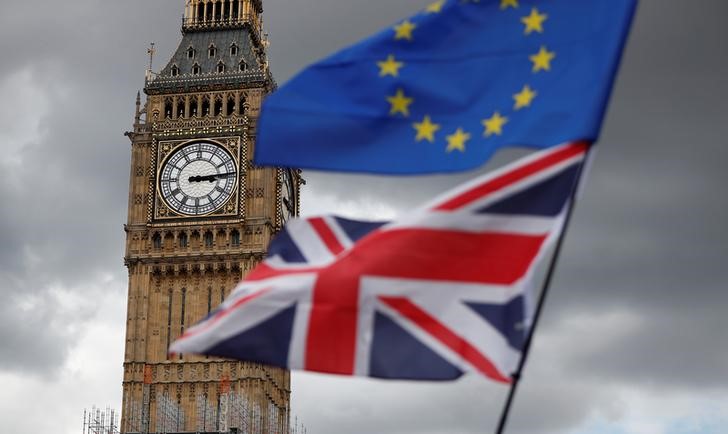 © Reuters. The Union Flag and a European Union flag fly near the Elizabeth Tower, housing the Big Ben bell, during the anti-Brexit ‘People’s March for Europe’, in Parliament Square in central London
© Reuters. The Union Flag and a European Union flag fly near the Elizabeth Tower, housing the Big Ben bell, during the anti-Brexit ‘People’s March for Europe’, in Parliament Square in central LondonBy Gwladys Fouche and Alister Doyle
OSLO (Reuters) – Norway hopes to open bilateral trade talks with Britain before London’s transition period to leave the European Union ends in 2020, as Brussels seems willing to show some flexibility on the question, the Norwegian foreign minister said on Friday.
The non-EU country is keen to start formal talks with Britain, its biggest trading partner, to which it sells gas, fish and services, so it can regularize their trade relations after Brexit.
Britain is due to leave the EU in March 2019, but London and Brussels have agreed to a transition period until the end of 2020 during which Britain will have restricted powers.
Brussels has often said that Britain cannot open formal bilateral trade talks with third countries, such as Norway, until after the divorce from the EU is settled.
“My impression is that the EU side will try to take a flexible approach to this,” Foreign Minister Ine Eriksen Soereide, who visited Brussels on Wednesday, told reporters.
Norway is a member of the union’s common market for goods, services, capital and labor via the European Economic Area (EEA) Agreement, but Prime Minister Theresa May has rejected this option for Britain after Brexit.
“On the one hand, you can say that the formal demand is that they (the British) cannot start negotiations before … the transition period is over. But I’m not entirely sure if that will be enforced to the same extent as you could think,” she said.”
“So my impression as of Wednesday … is that (there) is the potential for some added flexibility,” she said, adding: “But we will have to wait and see. At least we have talks on both sides and will continue to do that with full force.”
Soereide also said Norway had good cooperation on many issues with President Donald Trump, despite sharp disagreements such as about the U.S. withdrawals from the Iran nuclear deal and the Paris climate agreement.
And she said her biggest foreign policy concern was to preserve broad international cooperation.
“The fabric is starting to become weaker,” she said, saying that the lessons of two world wars in the 20th century were “we are better off with a cooperation between countries and states instead of the strongest state always winning the race.”
A collapse of international cooperation would be “dangerous not only for small and medium-sized states, but it would also come back and bite the stronger states … at some point,” she said.
(editing by David Stamp)
Fusion Media or anyone involved with Fusion Media will not accept any liability for loss or damage as a result of reliance on the information including data, quotes, charts and buy/sell signals contained within this website. Please be fully informed regarding the risks and costs associated with trading the financial markets, it is one of the riskiest investment forms possible.
Source: Investing.com





























